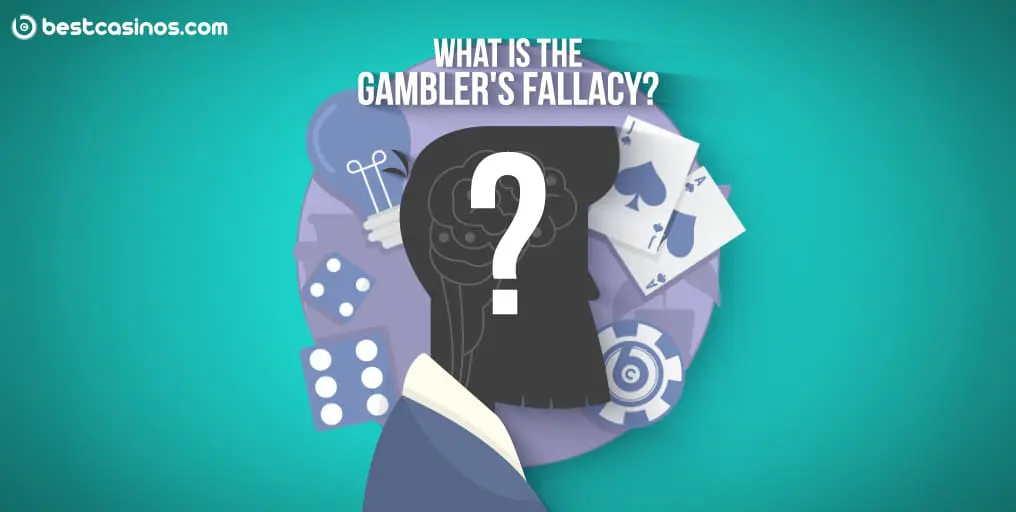
Explaining the Gambler’s Fallacy – Definitive Guide to the Gambler’s Fallacy
When Lady Luck drops in for a visit, it’s easy to get carried away. And when this happens, it is easy to slip into the gambler’s fallacy, a famous cognitive bias that got its name from the gambling circles where erroneous thinking thrives.
What is the gambler’s fallacy? Why do we exhibit gambler’s fallacy? BestCasinos will try to get to the bottom of the Monte Carlo fallacy and give you real-life examples of how misconceptions spill over from gambling tables to everyday lives.
What Is the Gambler’s Fallacy?
If you spent at least a day in a gambling joint – be it brick-and-mortar or digital – you have already encountered the Monte Carlo fallacy. The fallacy, also known as the gambler’s fallacy, is common with players who enjoy games of chance.
So, what is the gambler’s fallacy?
The gambler’s fallacy, or Monte Carlo fallacy, is the erroneous belief that a certain outcome is more likely to happen than some other outcome, based on previous results.
To bring this closer to you, let’s use a round of baccarat as an example.
As you know, baccarat has only three potential outcomes – winning the Banker, Player, and Tie bets. So, for example, if the five previous results were B-T-B-B-T, you are more inclined to think that the Player (P) is more likely to happen as it hasn’t occurred in the five previous rounds. Hence, you would probably wager on the Player to get the payouts.
You may also think that it is less likely to appear again since Banker has occurred three times. Hence, you opt not to wager on Banker anymore (thus wagering either on Player or Tie).
But, regardless of the stance you take, you’d be wrong. Both of these beliefs are wrong.
Seemingly logical, the Monte Carlo fallacy gives the players a false feeling of certainty after considering previous rounds. However, the entire point of its falseness lies in the very act of counting in previous rounds. Each outcome is a separate event and has exactly the same chances of happening every single time.
Examples of Gambler’s Fallacy in Different Casino Games

The gambler’s fallacy is ever-present. It’s everywhere, and it’s so easy to get yourself into it by losing focus for one second. You’ll notice players using flawed logic in every game in the online casino. Let’s see how it manifests in different casino games.
Before we switch to gambler’s fallacy examples, let’s sort our games. Casino games are generally divided into two groups: games of luck and games of skill. However, for the sake of this article, we’ll rename them into games of chance and games of logic, as logic plays an integral part in the story of cognitive biases such as the Monte Carlo fallacy.
Games of Chance
Games of chance are all games that do not require logic and skill to play. Moreover, the outcome of each round is independent, i.e., it has no connections with previous and subsequent outcomes. Slots, roulette, baccarat, and all dice games belong to this group. And even though their rounds are not linked in any way, they are common places for breeding faulty assumptions.
Let’s start with gambler’s fallacy roulette examples.
Imagine the ball landing in odd pockets seven times in a row. What are you going to think about the eighth round? If you think the next result must be an even number (because they’ve all been odd for so long), you will probably decide to wager on an Even Numbers wager. When the ball finally lands, and the wheel stops turning, you might win or lose, but the process of getting to the wagering decision was already wrong. Why? Because you decided what you will bet on based on faulty logic, not a logic-based prediction. Therefore, the outcome (let’s say you’ve won) has nothing to do with your ‘gut feeling’. You weren’t right – you were lucky.
Slots
Slots, by far the most popular casino game category, attract millions of players each year. For most players, they are the sole reason they visit gambling sites in the first place, but they are also the biggest instigator of the gambler’s fallacy in the gambling world. How so? Online slots rely on RNG (Random Number Generator), which guarantees unpredictability and randomness of the results. Nevertheless, players still manage to get wrongful assumptions during their sessions. The origin of the assumptions stems from their desire to win.
Simply put, believing that you are about to win, especially after a couple of losses, is something all players are prone to. But this thinking leads nowhere, as spins are completely unrelated. Instead, each spin produces an individual result that has nothing to do with other outcomes.
Dice Games
If you are a fan of sic bo or craps, you can end up in the same pickle as slot players. Dice throwing is usually highly unpredictable, and the only way to affect the outcome is to practice dice control. However, even with dice control, you can mistakenly assume you are about to land a specific outcome or win by wagering on a specific bet. If you think a certain outcome is due because of previous rounds, you are making a huge mistake that can cost you dearly in the long run.
Games of Logic
The other side of the coin features blackjack, poker, and any other game in which the outcome is connected to the preceding and succeeding results in some fashion. These belong to the logic game group. You use skills to achieve the desired result, and your actions affect the outcome. This is precisely why the gambler’s fallacy is so dangerous and hard to explain with such games. Poker and blackjack are the best representatives of their group, but the players may encounter misconceptions even there.
Blackjack
In blackjack, the number of decks determines the shuffle. If you have one or two decks, the shuffle will likely occur after each round. With six and eight decks, the shuffle usually happens around 50% of the shoe, which players use for card counting techniques.
But regardless of the number of decks, nothing can stop you from getting the sudden feeling that you are about to win. This fake gut feeling is the Monte Carlo fallacy in disguise. Here’s an example when it appears – let’s say you’ve gone bust four times in a row. You are about to play a new round, so it must mean you are very close to hitting a blackjack. Is that true? No. Unless you are counting cards (or using another similar advantage gambling method), you cannot know for sure what is the next outcome. Plus, basing your expectation of a win on the fact you’ve lost four times only sounds logical, but in reality, it’s far from it.
The Psychology Behind Monte Carlo Fallacy
By now, you’ve figured out how dangerous the gambler’s fallacy is for average casino players. The only way to fight it is to learn why it occurs in the first place. So, here’s a million-dollar question for you.
Why do we exhibit gambler’s fallacy?
The Monte Carlo misbelief is a form of cognitive bias. A cognitive bias is a systematic form of deviation from norms and rationality in judgement. This means that you tend to form conclusions based on evidence, where even smaller samples and short-term sequences may serve as evidence to support that conclusion.
Furthermore, taking shorter sequences of events as consequential, paired with the belief that chance is a self-correcting process, generates the gambler’s fallacy.
Here’s how: if you use five or six previous outcomes in a game of roulette as evidence and pair it with the belief that winning chances aim to even out (wins and losses are equal and interchange on the wheel), you are stepping into the gambler’s fallacy.
All this happens because our brains are geared towards simplification, i.e., they tend to simplify information processing to reach conclusions faster. Hence, in the end, our brain’s desire to make judgement easier may result in a wrong judgement.
Other Misconceptions & Gambling Fallacies
Cognitive biases are common, and the gambler’s fallacy is only one example of logical inconsistencies in our judgement. Although they are aplenty, they are generally hard to classify and organise into structures, as some may overlap. This ‘overlap’ leads to the gambler’s fallacy fallacy, a misguided idea that every form of faulty thinking about gambling outcomes is labelled as the Monte Carlo fallacy.
- Hot Hand Fallacy
- Illusion Control
- Dispositional Luck
- Base Rate Neglect/ Bias
- Sample Size Discredit
To understand better what happens inside the brains of casino goers, let’s explore five other common gambling fallacies.

· Hot Hand Fallacy
The hot hand fallacy is often confused with the gambler’s fallacy. However, the hot-hand misconception stems from basketball. It is a cognitive bias according to which a player expects a result to happen based on the previous results. However, it’s different from the Monte Carlo misconception because the expected result is a continuation of the previous streak, not a break from it. For instance, players with the Monte Carlo belief think that a losing streak is bound to end with a winning streak (because chance is self-correcting, the outcomes intend to even out). On the other hand, those who believe in this hot hand misconception think the losing streak will continue with more losses.
· Illusion Control
Both previous fallacies touch upon illusion control. Illusion control is the false belief that you can control outcomes and events clearly out of your control. It happens in all segments of life, but gambling is a great example as it shows players who are confident in their prediction about outcomes that they clearly cannot control (such as dice games, slots, and roulette).
· Dispositional Luck
In short, a belief that luck chooses some things over others translates into a belief of dispositional luck. For instance, a random game such as roulette dice are unpredictable, and the result is randomly determined. Therefore, believing that one number is more likely to appear because they are more fortunate than other numbers brings forth the dispositioned luck false belief.
· Base Rate Neglect/ Bias
The base rate bias refers to erroneous judgment. Someone presented with base rate information and specific information does not merge info to form an informed decision but rather foregoes base rate information to reach a (false) conclusion. The lottery is a great example. For instance, a player might think that the chance of winning the lottery is higher than it really is because he only considers the players whom he knows that have won (thus neglecting the statistics about other, unknown players who have played and haven’t won).
· Sample Size Discredit
Discrediting the sample size is related to the base rate bias because both diminish the importance of the whole sample size. However, the sample size discredit fails to understand that smaller evidence samples experience greater deviations, while greater samples do not. Moreover, deviations from expected results are rare in big samples (or longer streaks/sequences). Hence, you might think that you are going to win over the course of 100 spins as often (and as much) as you’ve won in 10 spins.
Tips to Avoid Gambler’s Fallacy

We have another million-dollar question!
How to disprove the gambler’s fallacy?
Really, is there a way to avoid the Monte Carlo fallacy? And if yes, how can we do that? Well, there is a way, and it is really easy. All you have to do is think calmly and rationally and control your activity using a betting system.
Surrendering to this misconception can be quite dangerous for you. You’ll see just how dangerous it can be once you hear the story of how the Monte Carlo fallacy got its name.
In 1913, a ball at a roulette wheel in a Casino Monte-Carlo had landed in a black number spot 26 times in a row. The chance of this happening is extremely low (1 in 66,600,000), and all those present were fascinated by the rare occurrence at the table. They started wagering on the Red bet because they were convinced the streak had to end soon. For them, seeing a Black bet win more than a dozen times in a row was inconceivable, and a Red wager was bound to happen soon. It did not. In the end, the Black streak ended after 26 consecutive rounds, which was mind-blowing. However, not everything was as fascinating. Namely, the players wagering against Black in hopes of breaking the cycle lost millions.
Do you see now how dangerous faulty logic can be if you are gambling real money?
If you want to overcome the gambler’s fallacy, try following these tips.
1. Realise that it is all in your head.
To eliminate a bad idea, you must first realise you are thinking that very idea. Hence, becoming aware of the misconception is the first step in ridding yourself of it.
2. Always keep in mind that dice, balls, and cards have no memory.
They are simply objects, and they don’t remember previous results. They cannot affect any result because they are separate events with independent outcomes.
3. Set up logical questions that will eradicate flawed assumptions.
If you design a set of questions that lead you to a logical conclusion, you cannot stray from the path and end up deep in erroneous conclusions.
4. Use betting strategies.
Betting strategies and systems are an excellent way to stay on course. You cannot get any unsound ideas if you know what you are supposed to do and never diverge from it. Pick the one that suits you the most (Paroli if you don’t have a big budget, Martingale if you have deeper pockets) and stick to it without excuses.
5. Analyse game statistics.
Instead of going straight for the jugular with rushed predictions, think about the game statistics and winning odds. Analyse betting options, payouts, and other factors that could affect the outcome.
Bear in mind that illogical thinking in games of skill mostly happens to amateurs. Experienced players who use betting systems, strategies, and money management techniques are less likely to experience faulty logic.
The Effects of Gambler’s Fallacy on Everyday Life
Does the gambler’s fallacy appear in real-world decision making?
Yes, the gambler’s fallacy spills over into all segments of your life. It is not limited to the gambling tables only, although it can cause great harm if you employ it whilst gambling.
Some of the most common gambler’s fallacy real-life examples include believing that a baby girl is due after two boys have been born in a family. Another (bizarre) example is the bias that people who fly on planes more often are more likely to end up in a plane crash. People who have failed job interviews five times in a row believe they will get a job the next time they go on an interview. As much as we would love for that to happen, we cannot because each interview is a separate occasion.
These ideas that we get are fine until they start affecting our decision-making processes. For instance, if you think you will end up in a plane crash because you’ve safely flown 15 times already, you might not book a flight – which is a direct consequence of your Monte Carlo fallacy. Furthermore, not preparing for an interview because you are convinced you will get it (because it’s long overdue, after four misses) can lead to another failure rather than a new job opportunity.
Conclusion
The gambler’s fallacy examples in real life are abundant, and you are always at risk to conclude something erroneously. What you should do is take extra time to rationalise the events to come to the right conclusion. Don’t let your fun and desire to win guide to you a false idea – fight against the gambler’s fallacy!













BestCasinos team consists of online casino experts dedicated to spreading their knowledge and experience to a wider audience, all in effort to help even the most inexperienced players gain their footing in this exciting industry.